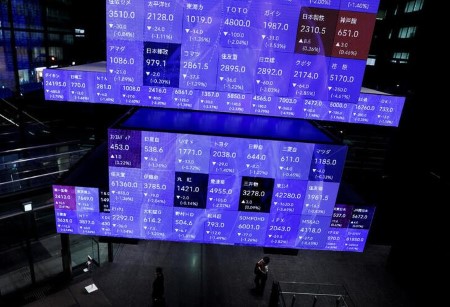




Inflation Update: Weak demand softens shocks
 DOWNLOAD
DOWNLOAD

Monthly Economic Update: Fed cuts incoming
 DOWNLOAD
DOWNLOAD

Consensus Pricing – June 2025
 DOWNLOAD
DOWNLOAD


TOP SEARCHES
Asian shares recover but concerns over China may resume strict COVID curbs linger

HONG KONG, Nov 22 (Reuters) – Asian stock markets mostly recouped early losses on Tuesday, supported by improved sentiment for China shares, but concerns lingered that Beijing may reimpose strict COVID curbs that could cause supply chain disruptions.
The dollar pulled back from strong overnight gains while oil took a pause from Monday’s retreat.
European stock futures indicated a sluggish open with Eurostoxx 50 futures up 0.15%, German DAX futures up 0.09% and FTSE futures FFIc1 up 0.30%
The broad Asia-Pacific index ex-Japan recovered earlier losses to inch 0.07% higher in the afternoon.
The biggest driver for the recovery was China, with its benchmark up 0.43%. Losses on Hong Kong’s benchmark index narrowed to 0.7%.
Support came from the property sub-sector, as fresh government moves dished out late Monday to aid the struggling industry helped buoyant sentiment.
China’s central bank said late on Monday it will provide 200 billion yuan (USD 28 billion) in loans to six commercial banks for housing completions.
Gains in China were capped by worsening COVID-19 situation in the country, however.
The fact China has showed movement away from on zero COVID is “very significant” but it has been drowned out by the latest new on resurgence of cases in Beijing, said Ray Attrill, head of FX strategy, National Australia Bank.
The Chinese capital warned on Monday it was facing its most severe test of the pandemic, fuelling investor concerns that China may be forced to resume strict mobility curbs and issue stay at home orders across cities.
Surging cases in manufacturing cities may cause supply chain disruptions, said Redmond Wong, market strategist for Greater China at Saxo Markets in Hong Kong.
Japan’s benchmark Nikkei average rose 0.69%, as the yen’s weakness against the dollar raised prospects for domestic manufacturers.
Australian shares rose 0.59%, supported by strength in miners and banks.
The dollar pared some of its strong overnight gains on Tuesday after investors flocked to the safe-haven currency on nerves over China’s COVID flare ups, but analysts at the National Australia Bank questioned whether demand for the greenback was sustainable.
“Evidence US inflation has peaked and can fall significantly in 2023, together with China and Europe developments, convince us a USD depreciation cycle is now in train,” they said in a note on Tuesday.
US Treasury yields across most maturities rose on Tuesday amid expectations of further Federal Reserve interest rate hikes, as the market awaits latest Fed minutes due to be released on Wednesday to provide greater clarity.
The benchmark 10-year Treasury yield rose five basis points.
Oil prices rose on Tuesday, a day after Saudi Arabia denied a media report that it was discussing an increase in oil supply with OPEC and its allies.
US crude extended gains from early trades to rise 0.36% to USD 80.33 per barrel and Brent was at USD 87.88, up 0.49%.
Spot gold up 0.3% to trade at USD 1,742.91 an ounce.
(Reporting by Selena Li in Hong Kong, additional reportng by Kevin Buckland in Tokyo; Editing by Ana Nicolaci da Costa and Lincoln Feast.)
This article originally appeared on reuters.com





 By Reuters
By Reuters